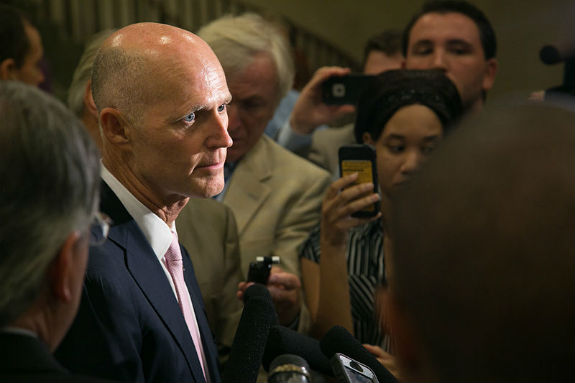
Rick Scott quits quest to randomly drug test state employees and welfare recipients. (Photo courtesy of Sara K. Brockman, State of Florida/Wikimedia Commons.)
By Francisco Alvarado
Florida Center for Investigative Reporting
On Monday, Gov. Rick Scott finally abandoned his 2011 executive order requiring random drug screens for more than three-quarters of Florida’s state employees, as well as recipients of welfare programs. But not before racking up a legal bill that will cost taxpayers $775,000.
Scott’s administration and the American Federation of State, County and Municipal Employees (AFSCME) signed a settlement agreement that ends a long running court battle over the broad use of random drug testing of state workers, according to an April 20 court filing. The union had sued the state to squash the executive order.
As part of the settlement, Florida agreed to pay $375,000 to the American Civil Liberties Union (ACLU) for its representation of AFSCME. The Scott administration also spent $400,000 on its own lawyers. Nevertheless, Scott hailed the settlement as a victory.
“We are pleased that the settlement will allow Florida to protect families by ensuring state employees working in the most critical areas of safety and security remain drug-free,” said Scott spokesman John Tupps in a press statement.
The ACLU challenged the 2011 executive order, which potentially affected 77 percent of the state workforce and also targeted welfare recipients, on the grounds that it violated the U.S. Constitution’s Fourth Amendment, which prohibits unreasonable searches and seizures. In court, the ACLU argued employees can’t be required to sacrifice their constitutional rights in order to work for the state without first establishing them as a threat to public safety or a suspicion of drug use.
“Gov. Scott’s executive order rested on his belief that the state has the authority to require anyone it chooses to submit her bodily fluids for government inspection without reason or suspicion,” said ACLU of Florida staff attorney Shalini Goel Agarwal in a press statement.
After the 11th U.S. Circuit Court of Appeals ruled in May 2013 that found the governor’s order to be too broad, the Supreme Court declined Scott’s request to review his administration’s appeal.
The appeals court said Scott could not require all employees to take tests, although it was justified for some workers, including those involved in law enforcement. The settlement also disallows the drug testing of welfare recipients, but it still allows for the state to drug test employees in security-sensitive positions like law enforcement.
